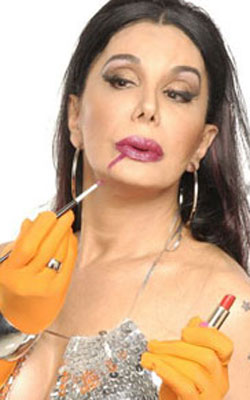This Friday, November 26th, Claudia Wonder left. One of the most important figures in the Brazilian gay scene, she leaves an artistic and social legacy that will make you school.
Born Marco Antônio Abrão in 1955, already in childhood and adolescence she showed a tendency towards the feminine persona. After entering adulthood, she became the transvestite who, in the early 70s, would earn the nickname Claudia Wonder.
Throughout the 70s, Claudia started to perform in gay nightclubs in São Paulo, in shows typical of the so-called "transformism" that was in force at the time. She was also introducing modifications to her body, on her way to creating the definitive feminine image.
Also in this decade, Claudia's participation in national cinema began. She appeared in films such as "O Marginal" (1974), by Carlos Manga, and started to appear in famous pornochanchadas of the period, such as "A Mulata que Queria Pecar" (1977), by Victor DiMello.
At the beginning of the 80s, pornochanchada left the scene, giving way to "head" films with explicit sex scenes. Claudia made her contribution to the genre by acting in "Sex of the Abnormal" (1984) and "Sexo Livre" (1985), both directed by Alfredo Sternheim.
But Claudia's greatest tour-de-force in the 80s would not be in cinema, but in music. Leading the rock band Jardim das Delícias, she became something unprecedented in Brazil: a transvestite leading a rock group. With the show "Vômito do Mito", the band performed at the underground house Madame Satã, including the historic performance in which Claudia, naked and with a horse's head, entered a gooseberry bath and threw the liquid at the audience, symbolizing the HIV blood that exploded with the terrible AIDS, at the height of the epidemic.
From then on, Claudia became a diva of the 1983s underground and began to perform in avant-garde theater shows, with Teatro Oficina and other companies. His participation in "O Homem e o Cavalo" (XNUMX), directed by José Antônio Martinez Corrêa, became famous.
In the 90s, Claudia went into exile in Europe, and returned to Brazil at the end of the decade, to resume her position as an alternative diva from São Paulo. She acted in the short film "A Cama do Tesão" (2000), by Lufe Steffen, and in the feature film "Carandiru" (2003), by Hector Babenco.
In the 2000s, Claudia began to produce frantically, seeming to race against time. She resumed her musical career and released the CD "Funky Disco Fashion" in 2007, which featured gems of the night, such as "Atendimento", which became a hit and slang.
In the midst of the shows to promote the album, she still found time to publish the book "Olhares de Claudia Wonder – Crônicas e Outra Histórias", released by Edições GLS, and also developed intense work as a militant and activist. Claudia worked at the Flor do Asfalto Gender Identity Study Group, participated in the production of Casarão Brasil and worked at the Diversity Reference Center.
Always fighting for greater LGBT visibility and the destruction of labels - she herself called herself a transvestite only because she was asked for a definition, but claimed to be "a man and a woman at the same time" -, Claudia remained persevering and defiant, regardless of the media in which he worked.
The crowning achievement of his career was the film "Meu Amigo Claudia", a documentary by filmmaker Dácio Pinheiro. The film, released in 2009, tells in images, excerpts from films and shows, and testimonials from Claudia herself, friends and personalities, all of Claudia's impressive trajectory.
Through a dizzying and fascinating collage, the film relates Claudia's work to the political-social life of Brazil, showing the strength and importance of her presence. "Meu Amigo Claudia" received several awards, including outside Brazil.
And the success of the documentary ended up being the great closure of his career. Unexpectedly, Claudia said goodbye to the scene at the age of 55. Her death on the morning of November 26th, in São Paulo – due to the disease cryptococcosis – shocked friends, fans and personalities from the Brazilian LGBT scene.
We remember and respect a personality, artist and person who taught lessons in courage and persistence, and still had a lot to offer his audience and society. Today the LGBT universe is sadder. In times of darkness and persecution of gays, may Claudia Wonder's star shine and serve as a light and guide for future generations.
Check out the photo gallery below, and the video with one of Claudia's last television appearances, during the program "Bola Dentro", produced by TV THE COVER at the 2010 World Cup.



